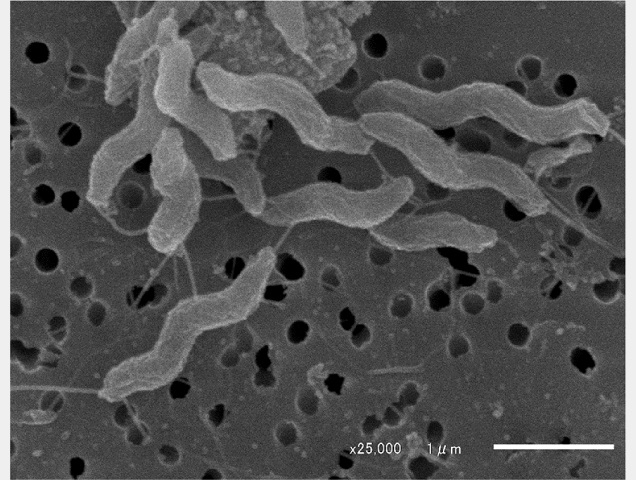Research News
Sep 25, 2024
- Veterinary Science
Campylobacter jejuni-specific antibody gives hope to vaccine development
By targeting multiprotein molecule, antibody inhibits bacteria’s growth, pathogenicity
Campylobacter jejuni
These spiral rod-shaped bacteria are a leading cause of enteritis, sometimes leading to diarrheal and extra-intestinal infectious mortality in children under 5 and elderly persons, respectively.
Credit: Osaka Metropolitan University

Bacterial infections resulting in enteritis, sometimes extra-intestinal infections such as sepsis, continue to be a global health concern. A leading cause of diarrheal and extra-intestinal infectious mortality among children under 5 and elderly persons is infection with Campylobacter bacteria, against which there is no effective vaccine or medication. An Osaka Metropolitan University-led team has recently uncovered what could be an important step toward preventing, diagnosing, and treating a species of Campylobacter bacteria.
Researchers including Professor Shinji Yamasaki and Associate Professor Noritoshi Hatanaka of the Graduate School of Veterinary Science and the Osaka International Research Center for Infectious Diseases at OMU focused on Campylobacter jejuni, the species of the bacteria that commonly causes gastroenteritis and sometimes extra-intestinal infections. Together they developed an antibody that can identify C. jejuni and inhibit the bacteria’s growth.
This monoclonal antibody reacts to a multiprotein complex known as QcrC, the expression of which is essential for the pathogenicity of C. jejuni. The QcrC molecule was found in multiple C. jejuni strains, lending high reliability to the antibody’s use in identifying the species. This molecule is also involved in energy production for C. jejuni, and the antibody acts to suppress this function, slowing the bacteria’s growth and decreasing pathogenicity.
“Our findings can lead to the development of preventive approaches so that Campylobacter infections do not become more severe, while also formulating a simple way to detect C. jejuni,” Associate Professor Hatanaka stated.
“The development of a simple detection system,” Professor Yamasaki explained, “will be useful for the rapid identification of contaminated food, which will be beneficial for the control of C. jejuni infections and food poisoning, along with vaccine development.”
The findings were published in Frontiers in Microbiology.
Funding
The author(s) declare that financial support was received for the research, authorship, and/or publication of this article. This work was supported by the Ministry of Education, Culture, Sports, Science and Technology of Japan (MEXT)/Japan Society for the Promotion of Science KAKENHI (Grant Numbers 22K15004 and 22KK0257 to KH; 21H02757, 20H05697, 20H04117, 20K08534, and 21H02145 to JK; 20H03936 to TN; 21K20769 to AS; 22J14541 to KY; 21J01602 and 21K17561 to SKo; 20K16247 to SY); the Japan Agency for Medical Research and Development (AMED) Grant Numbers 22ae0121035s0102 to KH; 22fk0108145h0003, 22ae0121042h0002, 22ae0121035s0102, and 223fa727001h0001 to JK; the Grant for Joint Research Project of the Institute of Medical Science, the University of Tokyo (to JK), the Ono Medical Research Foundation (to JK); and the Canon Foundation (to JK).
Paper information
Journal: Frontiers in Microbiology
Title: QcrC is a potential target for antibody therapy and vaccination to control Campylobacter jejuni infection by suppressing its energy metabolism
DOI: 10.3389/fmicb.2024.1415893
Authors: Koji Hosomi, Noritoshi Hatanaka, Atsushi Hinenoya, Jun Adachi, Yoko Tojima, Mari Furuta, Keita Uchiyama, Makiko Morita, Takahiro Nagatake, Azusa Saika, Soichiro Kawai, Ken Yoshii, Saki Kondo, Shinji Yamasaki, and Jun Kunisawa
Published: 2 July 2024
URL: https://doi.org/10.3389/fmicb.2024.1415893
Contact
Graduate School of Veterinary Science
Osaka International Research Center for Infectious Diseases
Email: n.hatanaka[at]omu.ac.jp
Email: yshinji[at]omu.ac.jp
*Please change [at] to @.
SDGs
